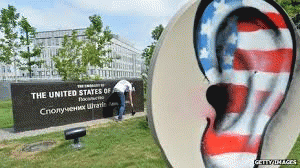There is a depressing statistical comparison that should shame all of us who voted twice for Barack Obama's ascent to the White House. Our man, a former constitutional law professor who pledged to reverse the Bush administration's abuses of national security concerns, has charged seven government whistle-blowers, including Edward J. Snowden, with violating the Espionage Act. That's more than double the combined three charged with leaking classified information by all previous presidents, George W. Bush included.
The defense of his unprecedented prosecution of those who dare tell us the truth is that we live in particularly dangerous times, an obviously absurd notion given the civil wars, foreign threats and other sources of mayhem periodically experienced by most of the world's nations. At its best, the "metadata" aggregation, including the logs of all email traffic and telephone calls, is a paranoid assault on our right to personal space enshrined in the Fourth Amendment. At worst it is an out of control grab for worldwide power over the new information age.
As a New York Times account Sunday suggests, "A close reading of Mr. Snowden's documents shows the extent to which the eavesdropping agency now has two new roles: It is a data cruncher, with an appetite to sweep up, and hold for years, a staggering variety of information. And it is an intelligence force armed with cyberweapons, assigned not just to monitor foreign computers but also, if necessary, to attack."
A surveillance power run amok? The latest disclosures from Snowden's leaks published in the German magazine Der Spiegel on Sunday turn out to have nothing to do with national security and everything to do with a compulsive and unseemly snooping not only into the lives of ordinary citizens throughout the world but also into the diplomatic correspondence, including trade and other negotiating strategies, of some of our closest allies.
How inconvenient to the outraged innocence of the National Security Agency and its private for-profit counterpart Booz Allen Hamilton to find the names of France, Italy, Japan and Mexico among the 38 embassies and missions bugged at will by our electronic spooks, along with the Washington and Brussels office of the European Union. The code-named Dropmire bugging of the encrypted fax machine at the EU and other invasions of the organization's private data were, as The Guardian summarized Sunday the content of the leaked documents, "to gather inside knowledge of policy disagreements on global issues and other rifts between member states."
Click Here to Read Whole Article
|
Rate It | View Ratings |
Robert Scheer is editor in chief of the progressive Internet site Truthdig. He has built a reputation for strong social and political writing over his 30 years as a journalist. He conducted the famous Playboy magazine interview in which Jimmy (more...)

OpEdNews depends upon can't survive without your help.
If you value this article and the work of OpEdNews, please either Donate or Purchase a premium membership.
If you've enjoyed this, sign up for our daily or weekly newsletter to get lots of great progressive content.
Most Popular Articles by this Author: (View All Most Popular Articles by this Author)
Christopher Hitchens: Reason in Revolt
The Peasants Need Pitchforks
Robert Scheer Hosts Dennis Kucinich -- an Unpredictable American Original
Obama Pulls a Clinton
Geithner and Goldman, Thick as Thieves
How Little We Know About the Origins of 9/11
To View Comments or Join the Conversation:





